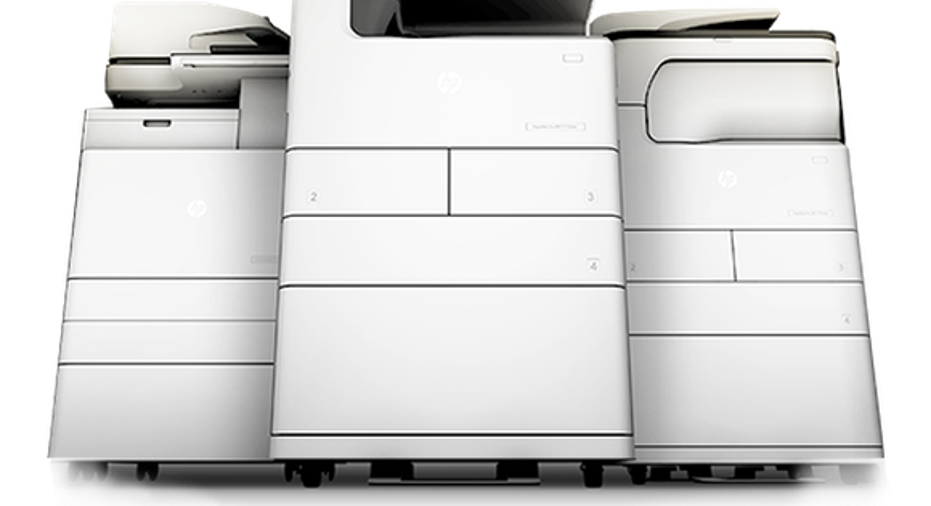Why HP Inc.'s Deal With Samsung Could Be a Game Changer

It may come as a surprise, given all the gloom-and-doom talk surrounding the "dying" PC market, but HP (NYSE: HPQ) is more than holding its own. Last quarter was a great example of CEO Dion Weisler and team delivering on their strategic objective of targeting niche markets within the struggling PC market, and HP's fiscal third quarter 2016 made it clear the plan is on target.
The same can't be said for HP's other division, printing. If not for a woeful quarter of printing-related sales, HP would have really surprised bearish pundits in Q3. Unfortunately, it was not to be. But a recent move by Weisler to "disrupt" a stagnant copier industry and bolster HP's bevy of printing solutions will be an absolute game changer for years to come.
A billion-dollar bargain
In an effort to "reinvent and replace service-intensive copiers with superior multifunction printing," HP recently inked a $1.05 billion deal with longtime partner Samsung (NASDAQOTH: SSNLF) for the South Korean conglomerate's printer unit. The acquisition is the largest printing-related deal in HP's long history.
According to HP, the copier market "hasn't innovated in decades," and with an estimated $55 billion in global sales available for the taking, a printer-copier combination utilizing today's technology, including the cloud and enhanced data security, could turn HP's woeful printing unit on its head.
Samsung's printing unit includes "a formidable portfolio of A3 MFPs" (multifunction printers) for the traditional printing market, some of which have a mere seven replaceable parts. As for sales, Samsung brought in $1.8 billion in printing revenue in fiscal 2015, which is a drop in the bucket compared to HP's $13.7 billion so far in fiscal 2016.
However, the deal involves a great deal more than simply rebranding and selling Samsung products. HP intends to combine its PageWide technology -- which improves quality, boosts efficiency, and reduces user costs -- with Samsung MFPs to develop a new generation of printers. And that's just the start.
Just as important to the deal are the ancillary assets that come with the $1.05 billion check HP will write sometime in the next 12 months, which is when the acquisition is expected to close. HP will retain nearly 1,300 Samsung engineers and researchers to bolster its own research and development efforts.
And what could prove to be the most valuable aspect of the deal is the portfolio of "more than 6,500 printing patents" that will come along with the talentand the products. Samsung has also agreed to invest $100 million to $300 million in HP stock purchased on the open market once the regulatory hurdles are cleared.
Image source: HP.
Where to from here?
HP's $11.9 billion in revenue last quarter was a 4% decline compared to the year-ago period -- that's the bad news. The good news is that its personal systems unit -- home of HP's PC-related sales -- actually improved, albeit slightly, to $7.51 billion from last year's $7.5 billion.
Notebooks, in particular, performed admirably in Q3, with sales climbing 8%, to $4.3 billion -- easily making it the personal systems team's top revenue driver. HP's focus on niche markets, such as its new OMEN virtual-reality-ready notebooks and desktops, drove an increase in PC sales and the segment's share of the overall market in calendar Q2.
As for printing, the 14% drop in sales last quarter, to $4.4 billion, was led by a whopping 18% decline in supplies revenue. But along with the Samsung deal, Weisler has a plan to address that shortcoming. For one, HP will focus on selling high-end enterprise printers to increase supply sales. And HP's leadership position in both commercial and consumer 3D printing will also give it a boost going forward.
According to one estimate, 3D printing will generate $7 billion in revenue this year, up just $1 billion from 2014. However, two years from now the market is expected to skyrocket to $13 billion, and it is predicted to soar to $21 billion by 2020. Printing is HP's Achilles' heel today, but the Samsung acquisition, supplies sales strategy, and a burgeoning 3D market will make that a thing of the past.
A secret billion-dollar stock opportunity The world's biggest tech company forgot to show you something, but a few Wall Street analysts and the Fool didn't miss a beat: There's a small company that's powering their brand-new gadgets and the coming revolution in technology. And we think its stock price has nearly unlimited room to run for early in-the-know investors! To be one of them, just click here.
Tim Brugger has no position in any stocks mentioned. The Motley Fool has no position in any of the stocks mentioned. Try any of our Foolish newsletter services free for 30 days. We Fools may not all hold the same opinions, but we all believe that considering a diverse range of insights makes us better investors. The Motley Fool has a disclosure policy.



















